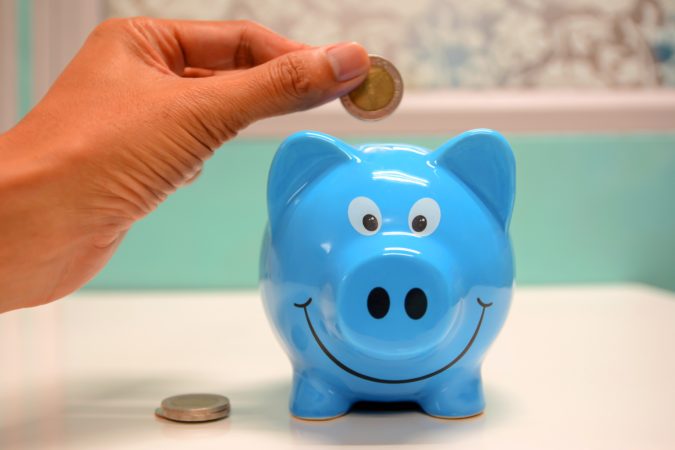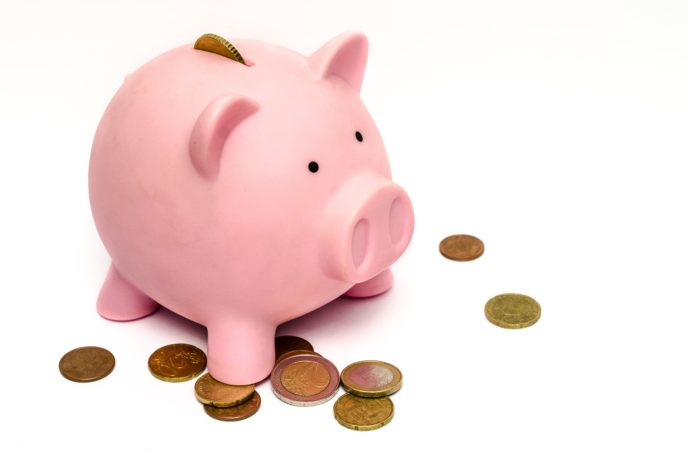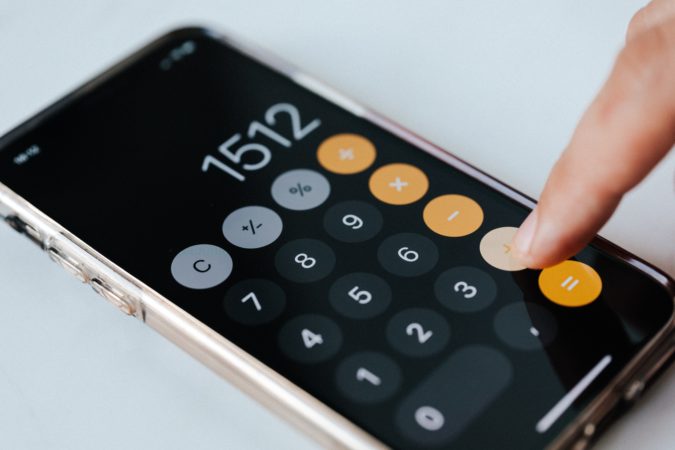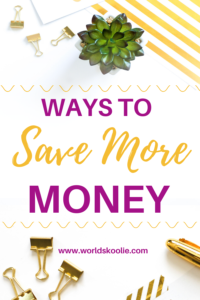If you’re looking for easy ways to save money, here is an quick-read list post of 21 Super Easy Ways to Save Money.
It’s full of money-saving ideas you can read all about in detail here or, if you’re short on time right now, grab my printable, summarised list of ways to save money right now using the form below.
1. Set savings goals and get the best interest rates

Having a reason to save gives you the motivation to put money aside or stop your excess spending in pursuit of your goal.
Open a new bank account and name it something motivating and target-related for you like ‘Holiday to …’ and set a savings goal for it. This is easily done with online banking.
Having this account at a different bank might even help you stay away from it more but if the best interest deals are to be had with your current bank, that would be a reason to keep it in-house with your other banking.
If you’ve bought property, take a 15 over a 30-year mortgage term. While monthly repayments will be higher, you’ll save tens or hundreds of thousands over the term of the loan in interest.
I don’t recommend credit cards as a way to pay for emergencies or luxuries but if you do use them, get one that has a low-interest rate and card costs over time and always pay it off in full when it becomes due for payment.
2. Set up auto deposits to a retirement or bank account

Pay yourself first every time you get paid.
Set up automatic deposits that transfer straight into your Super, KiwiSaver (NZ), 401k, or 403b (USA) accounts, and if your employer makes a contribution, at least match it.
Also good to know is that each year, in NZ, the Government will contribute up to $521.43 towards your retirement savings. You do not need to do anything to claim this contribution because your KiwiSaver provider will do this for you but to get it all you must contribute at least $1042.86 of your own money between 1 July to 30 June each year.
But even if you have not saved this amount, you still get 50 cents for every dollar you put in between 1 July and 30 June.
In addition, you are able to make a lump sum payment before 30 June each year to your KiwiSaver account so you qualify for the maximum $521 government contribution. That’s a 50% return! Sweet.
3. Ask yourself a few key questions before making purchases

- Do I really need this?
- Is it worth my time and money?
- Do I love it and will it make me or someone else happier?
- Can I borrow it or buy second-hand instead?
4. Take advantage of cheap and free fun
Do cheap and free activities together more often than eating out and shopping as a family, which often gets pricey fast. Better still, cook, and eat at home.
5. Eat-in

Making food at home instead of eating out at restaurants or ordering take out during the week will also save you lots of money. Here’s how…
Buying groceries from the supermarket and making your own meals is usually more nutritious and can save you a packet over convenient, ready-made food.
Eat breakfast at home. Oats, low-sugar cereals, and smoothies make for a healthy, frugal start to your day.
Making your morning hot drink at home too instead of buying on the way to work will save you that expense. If you’re attached to the superior quality of bought coffee, consider buying yourself a coffee machine that will upgrade your homemade experience.
Make lunch to take to work. This uses up leftovers so they’re not wasted and keeps your wallet in your pocket when you’re hungry around lunchtime.
Try not to walk past or stop and gaze at vending machines so you can avoid their costly lure.
If you go out for the day or a few hours, eat first, or pack snacks from home to take with. This will save you buying on the fly at pricey service stations and the like.
6. Record every purchase or make them all on your cash card
Knowing what you spend your money on helps you keep track of it so recording every cent you spend will help you to categorise all your spending and help you stay within your allocated budget. A great app for automating this is Pocketsmith.
7. Shop at second-hand stores

Buying good used items at thrift, charity, or opportunity shops can save you a lot. Patience is required as you can’t always find what you’re looking for on the spot but the savings often make the wait worth it.
8. Cut your subscriptions
If you cut your cable, Disney+, Sky, or magazine subscriptions how much would that save you monthly?
These subscriptions are luxuries, making them a good place to start saving money.
9. DIY

An easy way to save money is to grow your own food, make your own products, gifts or to do your own work so your labour costs are lower.
There’s not a lot you can’t learn from Youtube these days plus you up-skill yourself as you learn.
Ideas: veggie gardening, cleaning products, beauty products, haircuts, home renovations, sewing, and gifts.
10. Buy budget brands, in bulk and on sale
You can save a lot by buying things on sale or using app rebate services like Rakuten, BeFrugal, and Swagbucks which will earn you free gift cards.
Also, to save more, try buying the products that will do the job for less. I buy lots of value range products when I shop for tins, toilet paper, pasta, etc.
A good time to buy is when there are sales. Our local supermarkets often have $5 weeks when certain products are featured for less and that’s when I buy them most.
Buy in bulk when things are cheaper so they last you until the next sale if practicable. Don’t buy items if you don’t need them.
Look out for shop soiled or reduced items too. Often, because just the packaging is damaged, you can save a substantial amount off the regular retail prices.
Also, when you go to pay, watch as items scan through at the register. Sometimes prices or codes scan wrong and you can get them corrected and save a few dollars.
11. Stick to a shopping list
Making and sticking to a shopping list will give you focus and bring you out of a shopping trip richer overall.
Staying out of shops altogether, however, will save you even more money.
And when you really do need items, buy from places like Amazon that offer free delivery.
If you want to shop in person, eat before you go so you don’t shop for extras because you’re hungry.
12. Order groceries online
Ordering groceries online keeps you out of supermarkets, reduces impulse buys and you often stick to a list better.
These are great money-saving strategies plus online shopping using a frequently bought items list can save you time too – double win!
13. Reduce the advertising bombarding you
Stop junk mail being delivered to your home or email inbox. Less exposure to glossy marketing and their tempting products makes you less likely to spend on them, saving you more.
14. Eliminate costly habits

Make hot drinks at home or work instead of buying them. This one tip alone could save you $25 weekly if you buy Monday to Friday.
Borrow books, buy second hand, or swap instead of buying new. Libraries are great sources of free lending and activities for young and old.
I also love reading apps like Overdrive that give you access to digital collections for nothing, although you do need a library card to sign up with.
Do you get your nails done frequently?
A set of gels costs around $40 where I live. They last about three weeks and look fantastic but if you’ve got higher priorities, get rid of this cost. And if you can’t go without beautifully painted nails, buy some of your own polishes and paint them yourself or get a friend to.
15. Do family haircuts at home
I do my sons’ and husband’s haircuts myself with a set of Wahl clippers. They take hardly any time and it saves us about $50 per round.
Youtube can teach you anything so up-skill and save!
16. Reduce your heating bill

Can you get and use free firewood to heat your home?
Can you insulate or get double glazing put in? Some countries offer subsidies towards the cost of this.
If that costs too much, use Duck film on single glazed windows, thermal backed curtains and wear layers so you don’t need to run electric or gas heaters as much.
We installed a diesel heater in our camper and it’s much cheaper to run than the alternatives.
17. Don’t buy drinks on the road
When you’re out, buying sodas, alcoholic drinks or other bottled drinks like water adds up. Take your own choice of drink from home or fill up a reusable bottle wherever you go.
18. Compare prices before buying
When you’re wanting to buy new things, shop around to get them for the best price. I’ve saved hundreds of dollars on cameras in this way.
Sites like PriceMe compare the prices on over 825 000 products so you can easily find the best deal on a given item near you.
Some places also offer discounts or AirPoints so make sure you’re getting the best overall deal you’re entitled to.
19. Plan your menu based upon what you have
Creating your own or buying a ready to use meal planner can save you as they help you buy with purpose, use what you have and stick to a list of needed items. They also keep your menu varied and intentional which is less boring and planning ahead makes impulse take-out less likely.
20. Don’t kill time by shopping
You’ll find things to buy if you go wander the shops to kill time between activities. Go to a park, playground, or on a bushwalk instead to pass your time in a more wallet-friendly fashion.
You also don’t need everything you want so keep checking yourself before buying items. A delay before a purchase can help you think clearer and make a better financial decision.
21. Line dry your clothes
Instead of using a dryer, dry your washing on a line outside using the sun’s energy. If the weather in your area is fickle, install a washing line inside.
We put up a folding wall line in our garage and it was one of the best moves we made. In hindsight, I’d not have installed the big one outside at all, even though it has been great at times for larger items like curtains and blankets.
What are some of your favourite ways to save money?
Why not comment below?
And if you found this article useful, please share or pin it.



Thanks!

Meagan







